There’s this idea that superfoods are somehow much better than any other food group and should be consumed at all costs.
That’s not exactly true (1).
While thyroid superfoods have tons of benefits, which we will get into in a minute here, there’s nothing magical about them.
They are still foods.
But here’s where they shine:
They contain more nutrients per unit of food compared to other food groups.
And the foods that I’m going to be discussing contain MORE of the nutrients that your thyroid needs to function optimally.
This allows you, as a thyroid patient, to take advantage of these food groups to ensure that you are giving your thyroid everything it needs.
By taking the ingredients found in these superfoods you can help ensure that your thyroid will be able to:
- Help support thyroid hormone production
- Give your body the nutrients it needs to produce more T3 (through T4 to T3 conversion)
- Help fight off inflammation in the thyroid gland
- Support your immune system (especially helpful in Hashimoto’s!)
- Provide your body with natural sources of selenium and iodine
- Get more nutrients into your body per unit of food to help reduce overall calorie consumption
- Help manage food cravings and control your appetite
- Balance your cortisol and adrenal health
- And much more…
DOWNLOAD FREE RESOURCES
Foods to Avoid if you Have Thyroid Problems:
I’ve found that these 10 foods cause the most problems for thyroid patients. Learn which foods you should avoid if you have thyroid disease of any type.
The Complete List of Thyroid Lab tests:
The list includes optimal ranges, normal ranges, and the complete list of tests you need to diagnose and manage thyroid disease correctly!
7 Thyroid Superfoods You Should Be Eating Every Week
Before you read on, here are a couple of things to consider before you check out this list of superfoods.
The first is that your individual mileage may vary when consuming these foods.
Even though these foods are generally well tolerated, very healthy, and may help your thyroid, doesn’t mean they will help YOUR body or that you will even like them!
Each person is a little bit different in how they respond to foods, what type of foods they are able to digest, what type of foods they find palatable, and so on.
If you can, though, give these foods a try and see how you do!
I think you will be pleasantly surprised.
The second has to do with why these foods were chosen.
I picked these foods because they contain more nutrients that are beneficial to your thyroid than other foods.
This means that you can get more of the nutrients your thyroid needs without eating a ton of food.
What this doesn’t mean is that you MUST consume these foods if you want to get these nutrients.
There may be other foods that contain similar nutrient profiles but, in order to get to the levels I’ve outlined below, you will probably have to eat a bigger quantity of food to get there.
So keep that in mind if your weight is something that you are struggling with.
And lastly, even though these foods are jam-packed with thyroid-enhancing nutrients, doesn’t mean that they will take the place of all supplements.
Whenever possible it is best to get your nutrients from food, there’s no disputing that.
But when it comes to certain ingredients including things like iodine and selenium, it’s often better to supplement with these nutrients because it’s easier to fine-tune exactly how much you are consuming.
This will make more sense as we go!
In addition, you still may need extra nutrients beyond those found in these foods to support your thyroid.
Without further ado, let’s jump in:
#1. Blueberries

First on the list are blueberries!
Let’s hit some of the basics here and then I will explain why it matters.
Blueberries are an amazing source of phytonutrients and antioxidants.
In fact, when you compare the antioxidants per unit of blueberries they beat out a lot of other berries including strawberries, raspberries, and blackberries (2).
Blueberries are also great because they have a low carbohydrate count for the number of antioxidants and polyphenols that you get per serving.
1 cup of blueberries will give you about:
- 85 calories
- 21 grams of carbohydrates
- 24% of your daily intake of Vitamin C
- 36% of your daily intake of Vitamin K
The reason we care about the polyphenols, anti-oxidants, and anthocyanins found inside blueberries (3) is that patients with thyroid disease have a lot of oxidative stress.
Oxidative stress is a process that happens in your cells in which your body creates free radicals that run around and damage the inside of your cells.
The free radicals then cause oxidation of important parts of your cells and that is known as oxidative stress.
Anti-oxidants, such as those found in blueberries, help prevent this oxidative stress from occurring which is why they are called ANTI (meaning against) oxidants (referring to oxidative stress).
Some thyroid patients, especially those with Hashimoto’s thyroiditis, have a lot of this oxidative stress occurring in their thyroid gland cells and throughout their bodies (4).
As a thyroid patient, the last thing you want is damage to your thyroid gland because that will impair how much thyroid hormone you can create!
By consuming polyphenols you may be able to stop, reduce, or slow down this damage.
Thyroid patients with Hashimoto’s thyroiditis should always be looking for natural ways to prevent this damage from occurring.
Now let’s get back to the low carbohydrate count that I mentioned previously.
Blueberries are often recommended as one of the few fruits you can eat on low-carb diets because their carbohydrate count is so low compared to how many nutrients and antioxidants they provide the body.

So you can usually still eat blueberries if you are on a low-carbohydrate diet such as keto.
I’m generally not a huge fan of very low carbohydrate diets for thyroid patients, for reasons mentioned here, but even if you aren’t on keto it still may be ideal to cut down on your total carbohydrate consumption if weight is something you are struggling with.
There are also many studies that show that blueberries can help with brain-related issues including brain fog, depression, and cognitive decline (5).
As you probably are aware, many thyroid patients suffer from these very issues, particularly brain fog and depression.
How much should you consume?
I recommend at least 1/2 of a cup to 1 cup of blueberries each day. You can buy them raw or frozen, just make sure you are eating them somewhere in that range.
An easy way to get your daily dose of blueberries is to buy them frozen and put them into a morning smoothie, blend them all up, and enjoy your daily dose of polyphenols and antioxidants.
#2. Seaweed
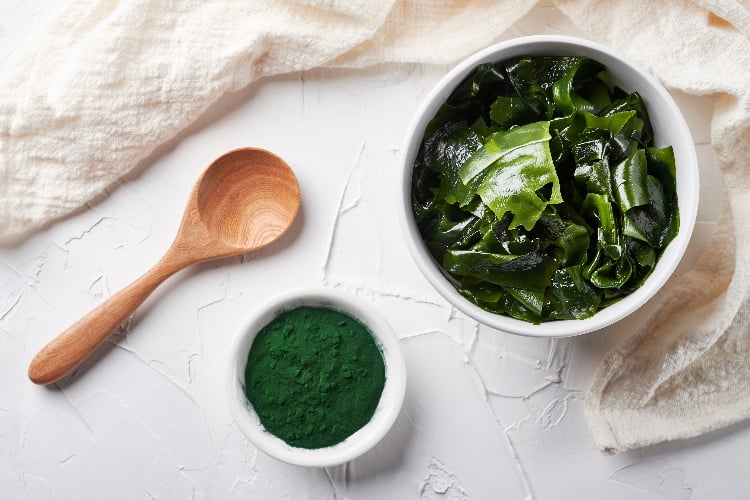
Next on the list is seaweed.
Seaweed is hands down the best source of iodine out there (6).
More iodine is found in each gram of seaweed compared to any other food.
This isn’t always a good thing though, and here’s why:
The fact that seaweed contains iodine is not the problem, instead, it’s that the amount of iodine per gram of seaweed can vary by quite a bit (7).
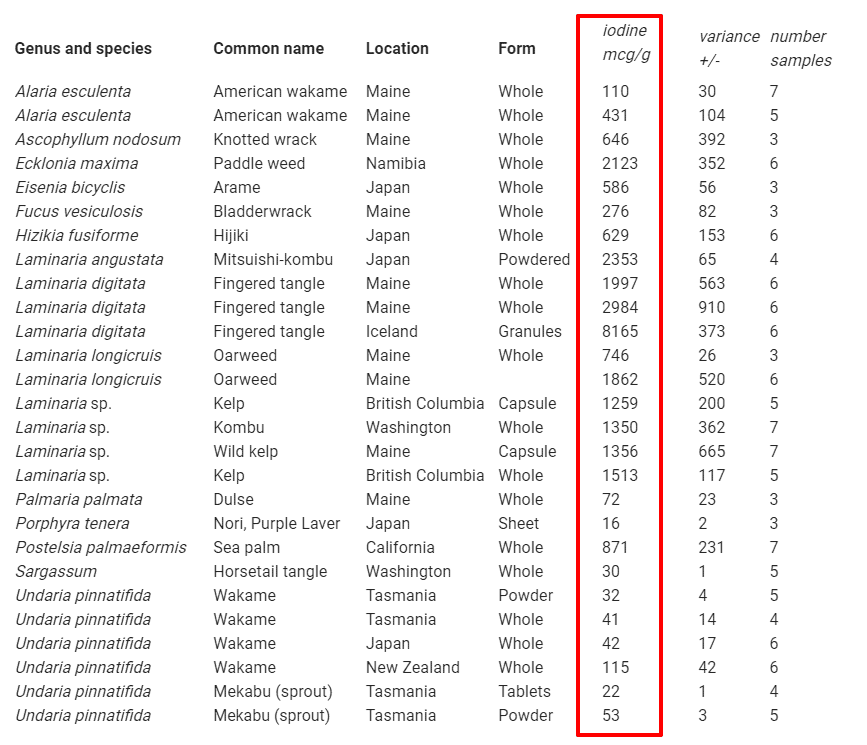
The range that iodine varies per gram in seaweed is anywhere from 16mcg per gram all the way up to 1,984mcg or more of iodine per gram.
Put into context, the average person needs around 150 to 300mcg of iodine per day for optimal thyroid function.
There are some people who can tolerate and consume a lot more, but most people do better with iodine when they start out slow.
Even though iodine is essential for all thyroid patients, for reasons that we will talk about in just a second, it’s still ideal to have some idea as to how much iodine you are consuming so you don’t accidentally take too much.
If possible, take a look at the type and quality of seaweed that you are consuming to see if you can get an idea as to how much iodine you are getting into your body when you eat it.
If that’s not possible, or if you think that the levels are too variable, then it may be better to use supplement forms of iodine or other foods that contain more consistent levels of iodine just so you know how much you are taking.
Let’s shift the topic to iodine for just a minute.
When it comes to iodine, thyroid patients really do need it.
Many thyroid patients have been told that iodine is dangerous for their thyroid, that it will trigger Hashimoto’s thyroiditis, or that it is somehow harmful.
Most of this is false, though there may be some kernels of truth.
We don’t fully understand why or how iodine can be harmful but we do know that iodine is REQUIRED for optimal thyroid function (8).
We also know that iodine is not something that the human body can produce naturally on its own which means you must get it from either food sources or from supplements.
We also know that iodine deficiency, or avoiding iodine, does cause reversible (usually) thyroid impairment (9).
I’ve explained why iodine is so essential for thyroid patients and why it is required to create thyroid hormones here.
The goal should be to ensure that you get enough iodine via your diet or with supplements to support your thyroid while also consuming nutrients, such as selenium, that can prevent iodine-induced damage in the thyroid gland.
We will talk about how to make sure you are getting enough selenium through your food choices in superfood #4.
The bottom line is that you need to make sure you are getting enough iodine into your body to support your thyroid.
You can get your iodine from food sources or from supplements, if you are worried about the dose that you are getting in your food then you will want to focus on using supplements because the iodine content is more controlled and less variable.
Iodine supplements allow for more fine-tuning of your iodine intake compared to certain food groups.
#3. Maca Root
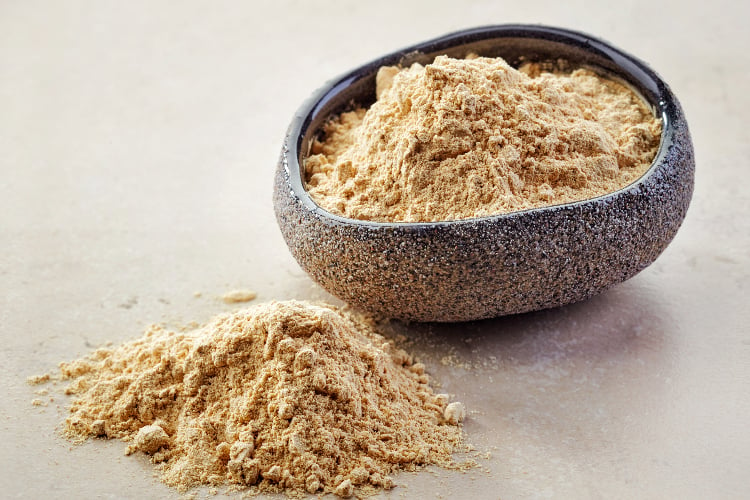
Maca is probably one of the least underutilized food groups that thyroid patients can benefit from.
The reason is simple:
Maca has a positive impact on your sex hormones!
This includes estrogen, progesterone, and testosterone in both men and women.
Maca root powder is absolutely amazing and something that I personally use each and every day.
If you’ve never heard of maca root, here’s what you need to know.
Maca is actually considered a cruciferous vegetable (10) so it is in the same family as broccoli, cabbage, and mustard greens.
It’s a plant native to Peru which is probably why we don’t see it very often in the United States.
Most people get maca into their diets in the form of powder.
Maca can be mashed up and desiccated into a fine powder that is then packaged and shipped out.
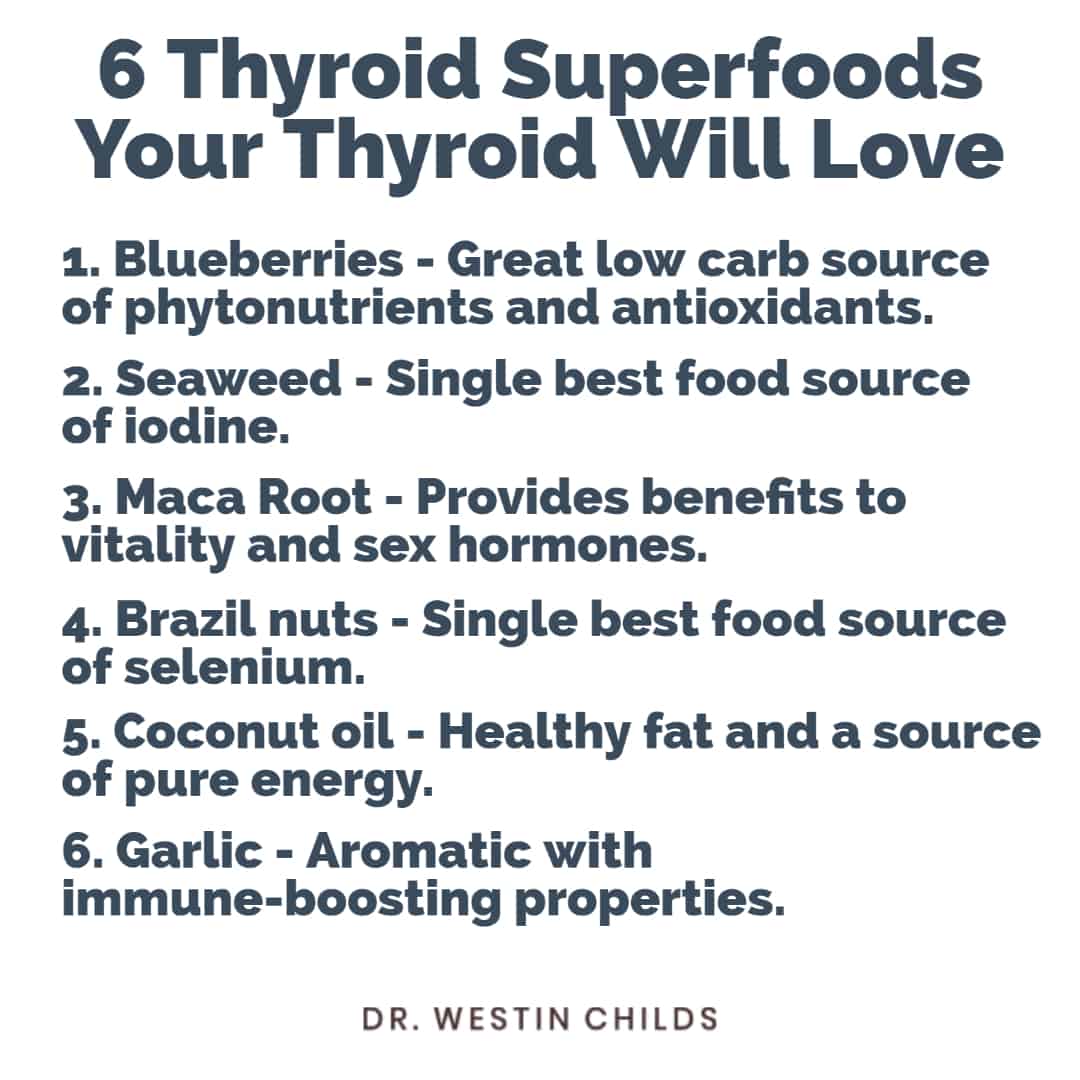
Because it’s in a powder form, it can be easily added to foods, blended up in smoothies, or added to protein shakes.
Maca is considered to be an adaptogen (11). An adaptogen is something that helps your body “adapt” to stress.
There aren’t very many adaptogens out there which means that maca finds itself in the elite family of adaptogens such as Rhodiola, ginseng, holy basil, and ashwagandha.
Maca is considered one of these which means it has the ability to help your body tolerate stress, support your adrenals, and balance your cortisol.
This matters to you as a thyroid patient because many thyroid patients also suffer from adrenal/cortisol issues in addition to their thyroid problems.
Taking maca root powder gives you another tool to support this important system.
The benefits don’t stop there, though.
Maca also helps to balance and restore your sex hormones.
In Peru, maca is considered to have positive effects on vitality, fertility, and sexual health probably because of its impacts on sex hormone levels.
If you are struggling with problems such as low libido (low sex drive), the inability to build muscle mass, depression, irritability, menstrual problems, or infertility, then adding maca root to your diet is probably a good idea!
2 tablespoons of maca root will provide your body with:
- 91 calories
- 20 grams of carbohydrates
- 4 grams of protein
- 1 gram of fat
- 2 grams of dietary fiber
- 133% DV of Vitamin C, 84% DV copper, 23% DV iron, 16% DV potassium, 16% DV B6, 11% DV manganese, 8% DV Niacin, 7% DV Calcium, 6% DV riboflavin
If you want to add maca into your diet then look for an organic maca root powder and aim for 1-2 tablespoons per day.
As I mentioned, it’s easiest to put this powder straight into a morning smoothie (with blueberries) or combine it with a protein shake.
This way you are getting anti-oxidant support, protein to help manage appetite, and all of the benefits of maca all at once.
#4. Brazil Nuts

Some of these foods do carry an element of controversy with them and Brazil nuts fit into this category.
Brazil nuts are one of the easiest and fastest ways to put selenium into your body.
1 brazil nut will yield somewhere between 68mcg and 91mcg of selenium.
This is a massive amount of selenium, especially when you look at the standard supplement dosing of selenium.
Most supplements contain about 100mcg of selenium per capsule/serving which means that 1 Brazil nut gives you roughly the same amount of selenium as most over-the-counter supplements.
Put into even more context, the RDA for selenium set forth by the government is 55mcg to 75mcg per day (12) (depending on your age and pregnancy status).
As you probably know, the RDA is usually set lower than what many patients need, especially those who have thyroid conditions, but it’s still helpful to know this information.
When we talk about selenium and brazil nuts, you have to understand that the dose of selenium found in each brazil nut can vary quite dramatically (13) such that it can be difficult to know exactly how much you are putting into your body.
And this is where you may run into trouble.
Selenium is incredibly important for thyroid function but it’s also potentially harmful if taken in large amounts.
You’ve probably heard that all you need to manage your selenium is 1 Brazil nut per day.
This stems from the assumption that each nut has about 91mcg of selenium in it but that may or may not be true as this number is really just an average.
It’s possible that one Brazil nut has 20mcg of selenium and another has 100mcg or more.
Much like the iodine issue in seaweed, you can run into similar problems with selenium in Brazil nuts.
Sometimes it’s difficult to know how much selenium you are getting each and every day, which means you may accidentally be taking too much.
Some people believe that up to 600mcg of selenium per day is around the maximum amount you would want to take before you see the signs of selenium toxicity.
My recommendation is to stay around 100mcg to 200mcg of selenium per day in total which includes how much you get from food and from supplements.
This range will ensure that you stay far away from the toxicity range but still get selenium to your thyroid.
If you want to get your selenium from brazil nuts then 1 brazil nut per day is probably all you need.
Having said all of that, it is still important to get selenium for your thyroid.
Selenium does two very important things as it relates to thyroid function:
- #1. It protects against thyroid-induced inflammation because it is required to produce glutathione (the master anti-oxidant). Studies have shown that taking selenium can help reduce TPO antibodies. If you have Hashimoto’s this means that you may be able to use selenium to protect against autoimmune damage (14).
- #2. Selenium is also required for T4 to T3 conversion (15), the process in which your body creates active thyroid hormone. Putting selenium into your body, if you are deficient, may help you produce more T3 thyroid hormone.
The bottom line?
Try to get somewhere between 100mcg and 200mcg of selenium per day total when you add up both your supplement and food sources.
Watch for signs of selenium toxicity as you do this which may include things like hair loss, nail changes, fatigue, stomach problems, joint pain, and nausea.
#5. Coconut oil
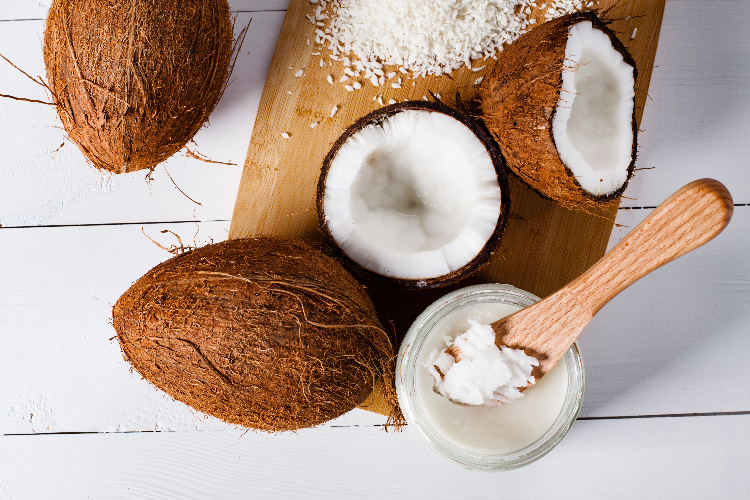
Coconut oil is considered a dietary fat but it’s much more than that.
It’s really a source of pure energy that can be used by your body and your cells immediately by the body after consumption.
This is pretty unusual as far as food goes.
Most sources of nutrients require breakdown or processing by the body in order to be used, especially long-chain carbohydrates.
Long-chain carbohydrates must be broken down into smaller fragments in order to get into the cells and function.
Coconut oil contains pure energy in the source of medium-chain triglycerides which are available for use by your cells immediately.
This is why coconut oil has been shown to have positive benefits in people who have cognitive issues, dementia, and depression.
In addition to these benefits, coconut oil is a great and healthy oil to both cook and bake with.
Unlike vegetable oils (which should be AVOIDED if you have thyroid disease), it does not result in inflammation in the body.
Some studies also show that coconut oil may help improve metabolism which makes it ideal if you are trying to lose weight.
How much should you use each day?
Somewhere around 1-2 tablespoons of coconut oil are ideal.
A word of caution for anyone who wants to use coconut oil:
Do not go overboard in your dosing!
It might be tempting to think that if coconut oil can help with weight loss, you should consume a lot more than I recommended above.
Coconut oil is a very nutrient-dense food so it contains a lot of calories per serving.
When I first learned about coconut oil, I would add it to my morning smoothies. Sometimes I would add as much as 5 to 6 tablespoons per day.
When doing this, I did start to see my weight creep up a bit because I was just consuming a ton of extra fat in my meals needlessly.
The best way to use coconut oil is to replace it with inflammatory fats like vegetable oils in your cooking and baking.
This way you aren’t taking too much and you are cutting out these inflammatory fats which can slow down thyroid function.
#6. Garlic
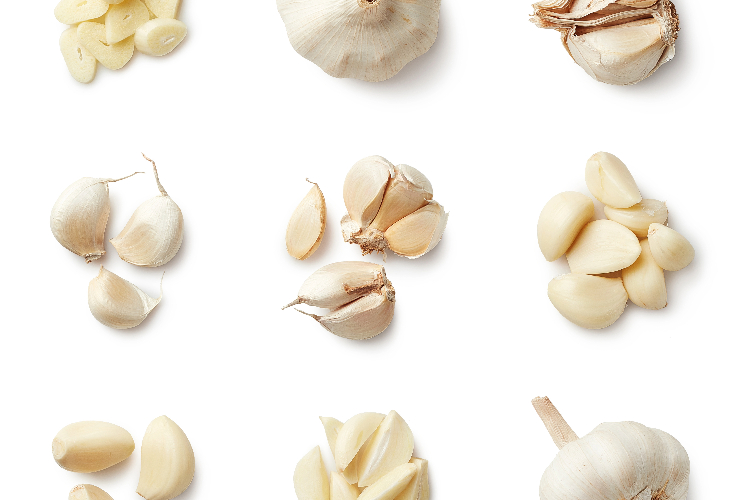
Garlic is an amazingly nutritious food that not only helps support many systems in the body (16) but also tastes delicious.
Garlic has a number of benefits but we are going to be focusing on those that impact your immune system.
This is because many thyroid patients have the disease known as Hashimoto’s thyroiditis which is primarily an autoimmune disease.
Autoimmune disease results from the disruption of regular immune function so anything that helps to balance the immune system, in the case of Hashimoto’s, may also directly impact thyroid function.
Consuming garlic each day has been associated with improved immune function, reduced frequency of illness, and a stronger immune system overall.
Because of its impact on immune function, eating garlic is beneficial for those with Graves’ disease, Hashimoto’s thyroiditis, most cases of hypothyroidism, and pretty much every case of thyroiditis.
Garlic has the added benefit of making pretty much anything taste amazing.
If you don’t want to cook with garlic or don’t like handling garlic, then you can use the powdered form.
The powdered form probably has fewer nutrients compared to garlic cloves but it’s still better than nothing.
If you don’t like the taste of garlic at all then you can use garlic capsules. Your target dose would be somewhere around 500mg to 1,500mg per day.
#7. Mussels
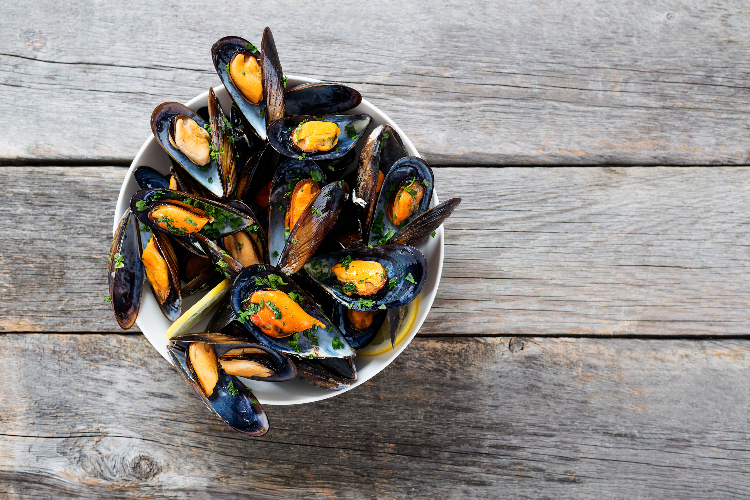
I’ve included mussels here specifically but you can swap out mussels for other forms of shellfish as they all have similar benefits but may differ in nutrient content slightly.
Mussels make the list because they are a great source of protein for their calorie content and they are also jam-packed with thyroid-specific nutrients that you want to get into your body if you have a thyroid problem.
Each serving (150g) of mussels will yield:
- 18 grams of protein for 129 calories
- Almost 1 gram of omega-3 fatty acids
- Potassium, selenium, magnesium, iodine, and zinc
Eating mussels gives you 3 main benefits for your thyroid:
The first is the protein-to-calorie content ratio.
Protein is one of the most powerful modulators of your appetite and because thyroid patients tend to struggle with weight gain, managing appetite is very important.
The second is from the omega-3 fatty acids.
Omega 3 fatty acids can help reduce inflammation which may help promote T4 to T3 conversion.
Inflammation is bad for both thyroid function (via Hashimoto’s thyroiditis) and thyroid conversion (via the negative effects that inflammation has on thyroid conversion).
The third is the thyroid-specific nutrients that thyroid patients tend to be deficient in.
Each serving of mussels provides your thyroid with the very nutrients that many thyroid patients are deficient in!
Thyroid patients suffer have high rates of deficiencies in zinc, selenium, iodine, and magnesium.
Mussels provide you with high concentrations of each of these nutrients which, in turn, help your thyroid function.
The only downside to mussels is that it does fall in the shellfish family which means you need to be careful if you have an allergy.
Also, keep in mind that this is another potential source of iodine and selenium.
So if you are also using supplements that contain these ingredients, make sure you are calculating how much you are consuming each and every day when you combine food sources and supplement sources.
I would recommend consuming mussels (or other shellfish) 1 to 3x per week.
Final Thoughts
These 7 foods have the potential to turn your thyroid back into the powerhouse that it deserves to be.
Each food provides a different benefit that has the potential to either help thyroid function directly, support the immune system, or indirectly support thyroid function by impacting other hormones.
As always, make sure you spend some time playing around with what works best for your body!
The most important part about managing your diet is finding foods that you both love to eat and that you will eat consistently.
It would be better for you to eat less nutritious food more frequently than it would be to get down foods that you don’t like and know you won’t eat consistently.
Now I want to hear from you!
Did any of these foods surprise you?
What food or food groups have you found to help your thyroid?
Were you already consuming these foods?
Are you planning on adding them to your diet?
Let me know in the comments below!
Scientific References
#1. https://pubmed.ncbi.nlm.nih.gov/29557436/
#2. https://www.ncbi.nlm.nih.gov/pmc/articles/PMC3274736/
#3. https://pubmed.ncbi.nlm.nih.gov/31329250/
#4. https://www.ncbi.nlm.nih.gov/pmc/articles/PMC4802023/
#5. https://pubmed.ncbi.nlm.nih.gov/30999017/
#6. https://ods.od.nih.gov/factsheets/Iodine-HealthProfessional/
#7. https://pubmed.ncbi.nlm.nih.gov/15588380/
#8. https://pubmed.ncbi.nlm.nih.gov/24926457/
#9. https://pubmed.ncbi.nlm.nih.gov/11396709/
#10. https://www.sciencedirect.com/science/article/abs/pii/S0308814602001334
#11. https://www.ncbi.nlm.nih.gov/pmc/articles/PMC3184420/
#12. https://ods.od.nih.gov/factsheets/Selenium-HealthProfessional/
#13. https://pubmed.ncbi.nlm.nih.gov/28923728/
#14. https://pubmed.ncbi.nlm.nih.gov/11932302/
#15. https://www.ncbi.nlm.nih.gov/pmc/articles/PMC5307254/
#16. https://pubmed.ncbi.nlm.nih.gov/16035690/
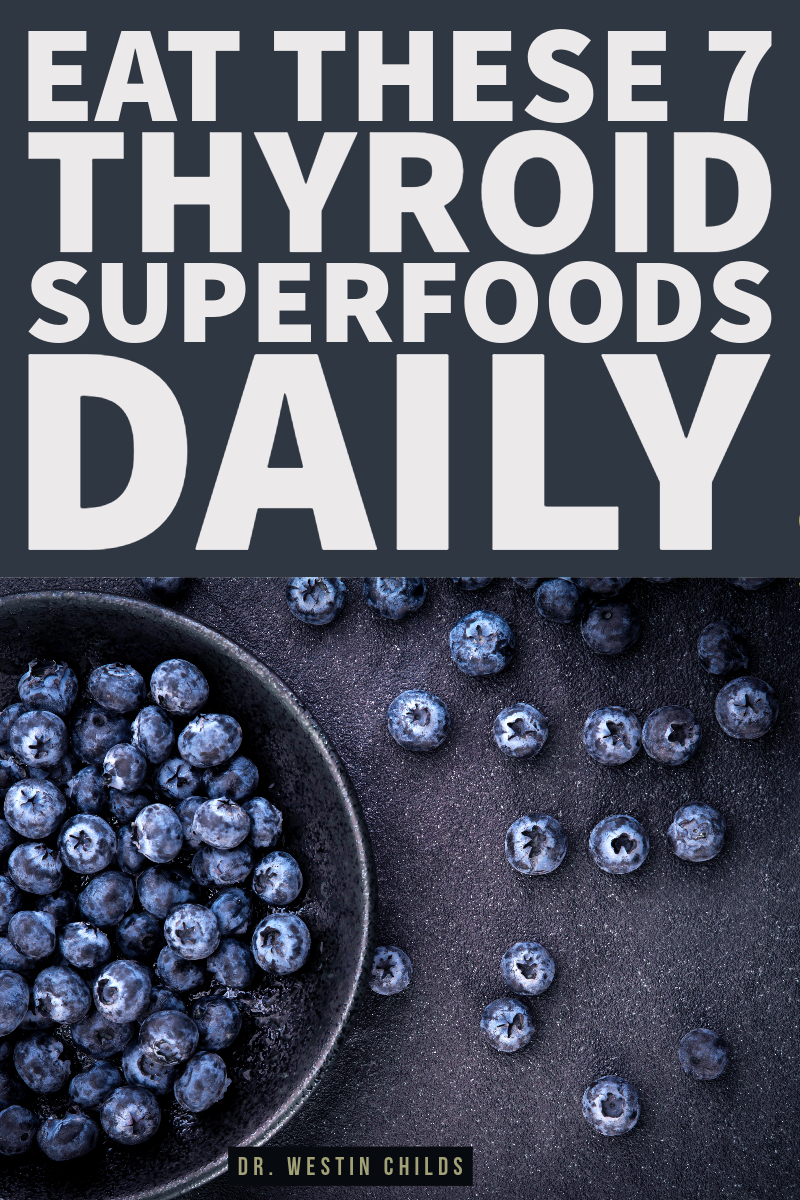
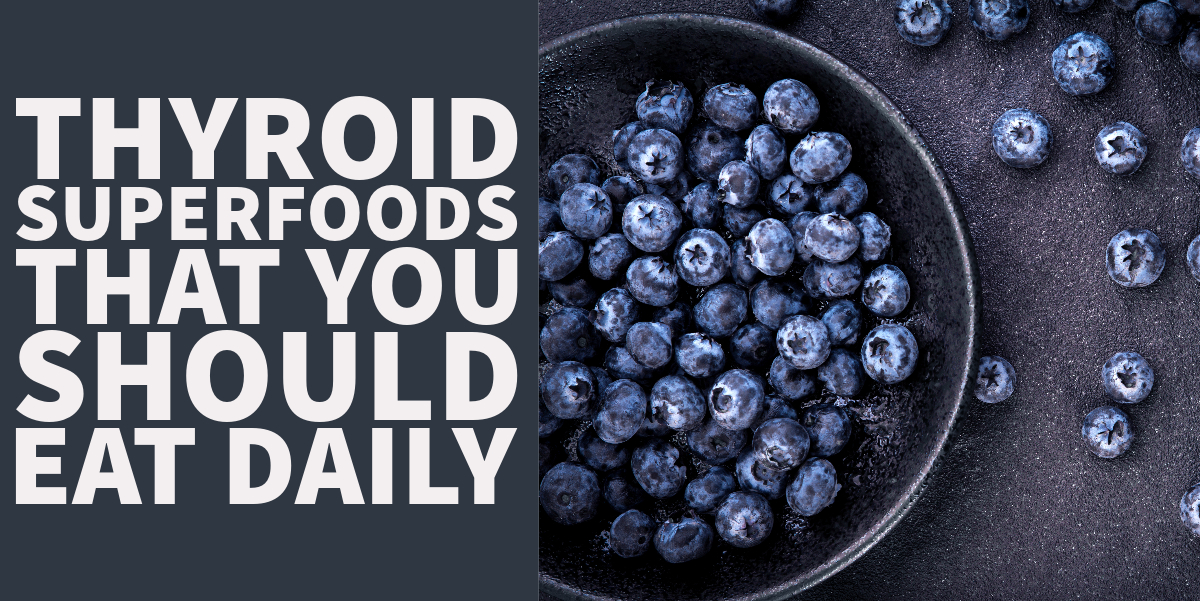








Hey dr child’s,
I recently just switched from Armour thyroid 120 mg to Tirosint 75 mcg and 50 mcg of liothiroine. Armour was too inconsistent but seemed better than what I switched too now. I’ve been on on the Tirosint/cytomel combo for 8 days now and feel not as good as I did when Armour was working.
Should I look to go BACK on Armour or give this new medication a few more weeks? I’m only 32 and want to get back to my life.
I also have recently had my prescription changed from Armour thyroid to Levothyroxine and Liothyronine, taking these for about 2-1/2 months now, & I’m tired! How long should I give it?
Hi Janet,
You will want to get your labs retested around the 8 week mark and then compare your results to whatever they were previously and combine those with your symptoms to determine if its the medication or dose or something else.
Hi Chris,
You want to give yourself at least 6-8 weeks before you consider swapping back.
Not a comment, but question re: seaweed…how , what forms to incorporate it ?
Feel a bit baffled.
Thanks!
Hi Bonnie,
I generally don’t recommend seaweed because the iodine concentration can vary so much. If you do want to consume it, though, there are many options available. It’s probably best to get something like dulse and then use that to season your food or add as a topping. This is probably the easiest way to consume seaweed frequently.
As Dr. Child’s mentioned Dulse, I”ll add that I make broths with Dulse seaweed but also you can buy it powdered to put on your food. Amazon carries both.
Cranberry juice has iodine and helps my thyroid work better
Hi Kay,
Glad it works for you 🙂
Hi Dr. Childs, I have read that Maca root can interfere with the effectiveness of some thyroid meds. Otherwise I’d be interested in trying it. Is that the case? I currently take Liothyronine/ Tirosint Sol combo. Thanks! Angie
Hi Angie,
Maca is considered a cruciferous vegetable so some people get concerned about the potential harm that may come from ingesting goitrogens (found in these types of veggies). If you were avoiding maca for this reason then you’d also want to avoid things like broccoli, spinach, cauliflower, cabbage, kale, and so on. While they may pose a theoretical threat to thyroid function, their benefits far outweigh any potential negative side effects which can easily be overcome by simply consuming more iodine. Iodine consumption negates the negative impact of goitrogens.
In addition, the processing of maca tends to remove most goitrogens which reduce the risk of it causing disruption to thyroid function. If you want to read more on the subject, I’ve discussed why goitrogens are not really a threat to thyroid function for most people here: https://www.restartmed.com/goitrogens/
I recently had a thyroidectomy and had thyroid cancer I was wondering if this would interfere with my medication or help.
Hi Kristina,
All foods have the potential to interfere with thyroid medication but this problem can easily be avoided by simply taking your thyroid medication on an empty stomach 🙂 So there’s really nothing to worry about provided you are taking your thyroid medication appropriately: https://www.restartmed.com/how-to-take-your-thyroid-medication/
I have Hashimoto’s and as a personal experiment because my friends kept sending me blogs and YouTube videos about how diet can affect or cure it, I went on a very strict three-month diet (no gluten, no dairy, no sugar etc…) with special recipes, designed by a nutritionist for a person with Hashimoto’s. I went to my doctor for a blood test before I started and then three months later. She compared the numbers (T3, T4 etc) and there was zero difference.
Hi Karen,
Thank you for sharing and I’m glad you brought this up! I’ve actually debunked the myth that diet alone is enough to heal Hashimoto’s in a separate blog post that you can read more about if you are interested but in regards to your comment here, diet is really only part of the equation. While diet is important, it doesn’t replace other therapies such as supplements, exercise, getting enough sleep, thyroid medication, other hormones, detoxification (if necessary), and so on. Diet just gets a lot of attention because it’s something that most patients can control and it sounds good. After all, who doesn’t want to cure their health problem with food? Unfortunately, it doesn’t work that way for most people.
In regards to your own personal experiment, I wouldn’t be too worried about the fact that your thyroid lab tests didn’t change much. You also should take into account how you were feeling. I can’t imagine that eating a healthy whole food diet (assuming it was whole foods and not processed foods) didn’t have some/significant positive impact on your overall health even if it didn’t have much impact on your thyroid lab tests. For that reason alone it’s probably worth continuing.
Link to Hashimoto’s myths here: https://www.restartmed.com/hashimotos-diet-myths/
I love following you and I learn so much. Just curious though, have you ever heard of anyone ever being allergic to Maca Root. I’ve tried it twice and both times I became violently ill. I have no other issues with cruciferous vegetables or other adaptogens. Thanks for any insight.
Hi Lisa,
I have not! Though I have seen all sorts of crazy reactions to pretty much everything you can imagine so I wouldn’t put it out of the realm of possibility.
so keenly interested in your discussion on foods. However are some of those same foods to be avoided for those with Hyperthyroidism? Highly active over producing thyroid with a need to quiet it down.
Hi Carl,
Yes, you can learn more about foods to avoid if you have hyperthyroidism here: https://www.restartmed.com/graves-disease-diet/
And here: https://youtu.be/jgDKvDP-GfI
Hi, that’s very helpful thank you. I have thyroid nodules (benign). Will these help? do you recommend surgery? or it can be reversed with foods. Last time I checked 1 was 4cm. thanks
Hi A,
Foods probably will not have a huge impact on your thyroid nodules unless they are caused by a nutrient deficiency. I’m not a proponent of thyroid surgery unless absolutely necessary.
I love using food tweaks like these. As per Michael Greger, MD’s recommendations, I recently began doing a weekly Brazil nut and I eat 2 nori sheets daily. I always aim for a 1/2 cup of blueberries daily. I do notice I feel better.
I retest my full thyroid panel in a few weeks, so we’ll see. I’m a vegan, whole food vegan diet person, so I wouldn’t myself do coconut oil or mussels. With coconut, however, I find the actual coconut itself to be healing. I like to eat a quarterly (haha!) young Thai coconut. I myself though have found I tend to feel better, less sluggish if I don’t consume more than 10-15% of my calories as fats. Even “healthy fats” don’t make me feel my best. I know everyone is different though. I’m a serious runner, so I’m guessing my body loves to run on complex carbohydrates and plant sources of protein. My recovery time after workouts is 12-24 hours faster at age 50 than it was in my teens or 20s. I give full credit to my vegan, whole food diet…which also dramatically reduced my thyroid antibodies to next to nothing.
I try to follow thyroid groups and discussions, the one thing I don’t see a lot, is if these thoughts, ideas or facts apply to someone who does not have a thyroid at all.
Hi Stacy,
Pretty much all of the information I discuss in regards to hypothyroidism applies to those without a thyroid. I can’t speak for other groups/people, though.
If you want to find specific information for those without a thyroid you can find more info in these articles: https://www.restartmed.com/tag/thyroidectomy/
What a timely article. I wasn’t aware of Maca and Mussels specifically. I have ordered Maca now.
As for mussels – I live in AZ (like you!) and so fresh seafood is kind of a challenge so I’m assuming canned mussels are acceptable, also? I eat canned smoked oysters, canned sardines and canned smoked clams about 2x a month so I know it should be palatable for me.
Hi April,
Yes, that should be just fine 🙂
I take 600mg to 1200 mg of krill oil for chloresterol a day havent had blood work yet to see if lowered seeings I cant take the medicine.It hurts muscles and liver so shouldnt the krill be good for inflammation along with the turmeric in ur vitamins i take
Hi Bonnie,
I’m not sure I am following. Are you referring to statins as the medicine that hurts the muscles and liver?
Would Macca be a more natural approach then HRT? I’m 64 and my new thyroid doctor wants to put me on bio-identical estrogen and progesterone for sleep and bone health. I’m 13 years out from onset of menopause.
Hi Jan,
It would be considered more natural but it is not as powerful as bio-identical hormone replacement therapy.
Hi Dr. Westin Child’s,
Thank you for this informative article. I have been treating my dog’s unstable thyroid with diet for the past year. Her overall condition has improved although she is a tad bit low on her thyroid and adrenal levels (determined by hair analysis). I would like to know what body weight are these recommended doses based on? My dog is 8.5 lbs and I have been afraid to put selenium and other minerals in her diet due to my inability to find an appropriate dose for her. I would appreciate your response as I cannot get this information from any of the vets I have brought her to. Thank you!
Hi Lucia,
Unfortunately, I’m not sure how these doses would translate over to an animal/dog.
Please fix this statement in the article:
“The best way to use coconut oil is to replace it with inflammatory fats like vegetable oils in your cooking and baking.”
Remove “it with” or just rewrite to make sure it is giving the correct information.
Sorry — I’m a proofreader and that drove me crazy.
Thank you for all your articles. They are extremely informative.